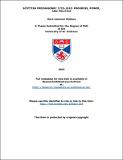Files in this item
Scottish freemasonry 1725-1810: progress, power, and politics
Item metadata
| dc.contributor.advisor | Allan, David | |
| dc.contributor.author | Wallace, Mark Coleman | |
| dc.coverage.spatial | v, 374 p. | en |
| dc.date.accessioned | 2007-05-03T12:02:19Z | |
| dc.date.available | 2007-05-03T12:02:19Z | |
| dc.date.issued | 2007-06-21 | |
| dc.identifier.uri | https://hdl.handle.net/10023/324 | |
| dc.description.abstract | Modern freemasonry emerged in Britain during the eighteenth century, combining earlier stonemason customs and methods of organization with the popular passion for clubs and societies. Although by no means unique in its ideology and constitution, freemasonry established itself after 1700 as a prominent fixture in both British communal and social life. Some mocked masonic lodges and their rituals, but they were an accepted feature on the social scene and, given that they avoided political and religious discussion and swore loyalty to the existing regime, their position was largely uncontroversial. The French Revolution, however, caused a severe backlash against the masons in Britain and Europe. During the 1790s, masonic lodges which were once viewed simply as charitable and convivial organizations were now seen as convenient vehicles for allowing radical groups to pursue covert revolutionary activities. As a result, legislation was passed which attempted to regulate these societies and eradicate any traces of secrecy. Despite its commitment to the establishment, freemasonry came under suspicion. This thesis examines the structure, nature, and characteristics of Scottish freemasonry in its wider British and European contexts between the years 1725 and 1810. As we shall see, masonic lodges and their members changed and adapted as these contexts evolved. The Enlightenment effectively crafted the modern mason and propelled freemasonry into a new era marked by increasing membership and the creation of the Grand Lodge of Scotland, with the institution becoming part of the contemporary fashion for associated activity. | en |
| dc.format.extent | 1529581 bytes | |
| dc.format.mimetype | application/pdf | |
| dc.language.iso | en | en |
| dc.publisher | University of St Andrews | |
| dc.subject | Freemasonry | en |
| dc.subject | Masonic | en |
| dc.subject | Scotland | en |
| dc.subject | Eighteenth-century | en |
| dc.subject | Clubs | en |
| dc.subject | Secret societies | en |
| dc.subject.lcc | HS597.A5W2 | |
| dc.subject.lcsh | Freemasonry--Scotland--History--18th century | en |
| dc.subject.lcsh | Freemasonry--Scotland--History--19th century | en |
| dc.title | Scottish freemasonry 1725-1810: progress, power, and politics | en |
| dc.type | Thesis | en |
| dc.type.qualificationlevel | Doctoral | en |
| dc.type.qualificationname | PhD Doctor of Philosophy | en |
| dc.publisher.institution | The University of St Andrews | en |
This item appears in the following Collection(s)
Items in the St Andrews Research Repository are protected by copyright, with all rights reserved, unless otherwise indicated.

